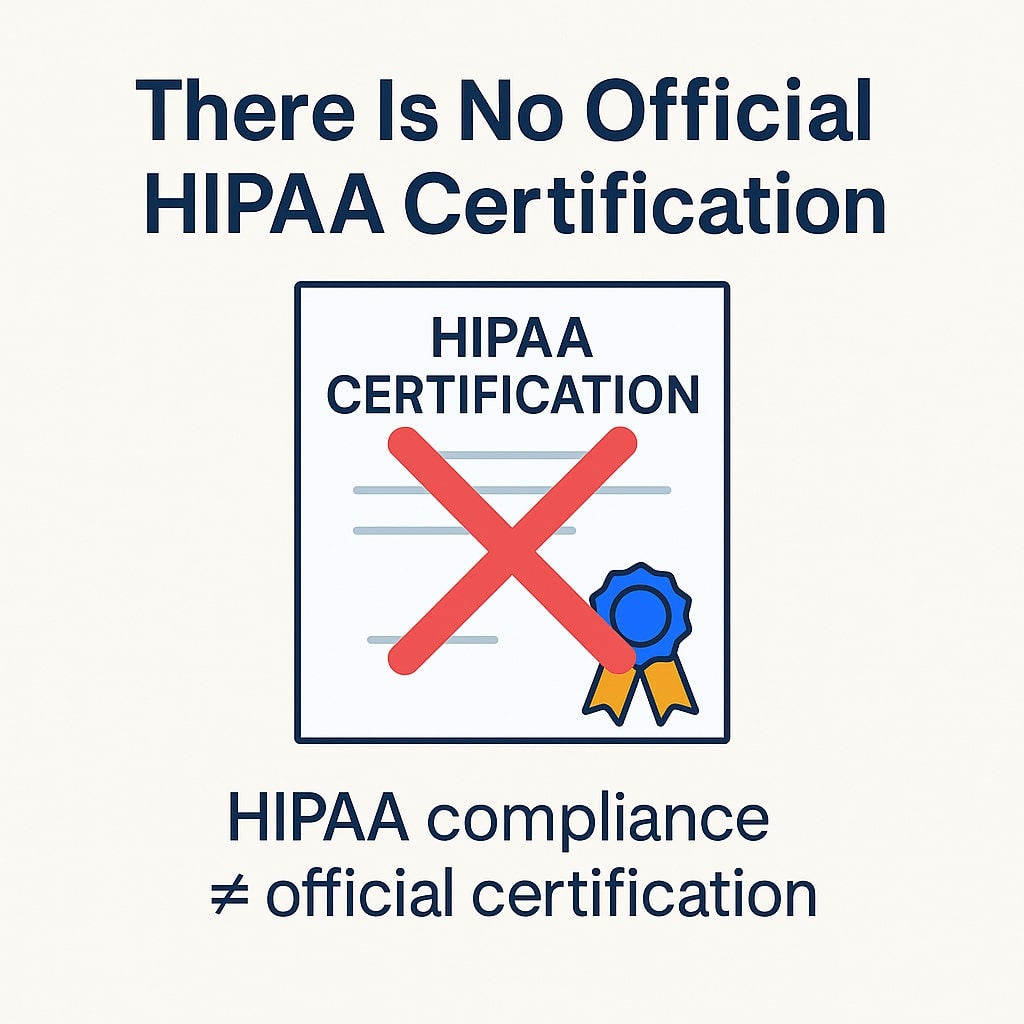The Confusion Around HIPAA Certification
Every month, thousands of people search for “HIPAA certification,” but here’s the truth:
There is no official HIPAA certification issued or recognized by the U.S. government.
The U.S. Department of Health and Human Services (HHS), which enforces HIPAA, does not offer or endorse any HIPAA certification programs. Still, many companies and individuals seek out so-called “HIPAA certifications” to demonstrate their understanding or compliance with the law.
So what does HIPAA certification actually mean? And is it useful for you or your organization?
Let’s clarify the confusion.
What Does It Mean to Be HIPAA Compliant?
Being HIPAA compliant means that your organization or you as an individual handling protected health information (PHI) understand and follow the administrative, technical, and physical safeguards outlined in the HIPAA Privacy Rule and Security Rule.
There are no official certificates or government-issued credentials that prove HIPAA compliance. Instead, compliance is demonstrated through actions, such as:
Providing HIPAA training for employees who access or process PHI
Implementing clear internal policies and procedures for data privacy and security
Conducting regular risk assessments and documenting mitigation steps
Responding appropriately to data breaches or unauthorized disclosures
📌 Important: You don’t become “HIPAA certified”, you work continuously to stay compliant with the law’s requirements.
Many companies choose to undergo third-party audits, gap assessments, or training programs to help them achieve and maintain compliance. These steps are helpful but do not carry legal recognition as proof of compliance.
Who Needs HIPAA Training or Compliance Support?
There is no “certification,” but you absolutely need to be compliant with HIPAA if:
You are a Covered Entity (e.g., hospitals, clinics, pharmacies, insurers)
You are a Business Associate (e.g., software vendors, billing services, consultants)
You or your team handle Protected Health Information (PHI) in any capacity
This includes medical staff, administrative employees, IT teams, software developers, and even marketing contractors working with health data.
HIPAA Training vs Compliance Validation
Since there’s no official HIPAA certification, the industry has developed its own terminology:
1. HIPAA Training Certification
Audience: Individual employees, healthcare workers, contractors
Purpose: Demonstrates awareness of Privacy Rule, Security Rule, and data protection best practices
Providers: Private companies like hipaatraining.com or American Health Training
2. HIPAA Compliance Review / Attestation
Audience: Organizations (especially SaaS or B2B healthcare vendors)
Purpose: Independent audit or gap analysis by a consultant or cybersecurity firm
Outcome: Internal documentation or report showing steps taken to meet HIPAA obligations — not a government-issued certificate
Is HIPAA Certification Required by Law?
No.
HIPAA requires compliance, not certification.
But organizations are expected to show proof of training and risk management. That’s why many opt to:
Train their employees and keep certificates on file
Work with compliance firms to document their safeguards
Use third-party “HIPAA certification” services as a sign of due diligence
In the event of a breach or audit, this documentation won’t exempt you from penalties, but it may reduce your legal exposure.
What Happens If You’re Not HIPAA Compliant?
Failing to comply with HIPAA regulations, even if it’s not legally required, can lead to serious financial, legal, and reputational consequences, especially if protected health information (PHI) is mishandled, lost, or exposed.
The U.S. Department of Health and Human Services (HHS) Office for Civil Rights (OCR) is responsible for enforcing HIPAA. They conduct investigations, audits, and respond to breach reports.
Here’s what’s at stake if you’re not compliant:
Civil penalties: Fines range from $100 to $50,000 per violation, with an annual cap of $1.5 million per type of violation
Criminal charges: In cases of willful neglect or intentional misuse of PHI, individuals may face fines and imprisonment
Mandatory corrective actions: Organizations may be required to implement costly remediation plans, audits, or monitoring
Business consequences: Losing trust with healthcare clients, failing vendor assessments, or becoming ineligible for contracts
📌 Example: In 2023, a healthcare technology provider was fined $350,000 after failing to encrypt portable devices that stored PHI — a basic HIPAA safeguard.
Bottom line: Compliance isn’t optional. Even unintentional mistakes can be costly, which is why proactive risk management, training, and documentation are critical.
How to Approach HIPAA “Certification” the Right Way
✅ For Individuals
Take a short online course (~30–60 minutes)
Learn the essentials: PHI, Privacy Rule, Security Rule, breach notification
Get a training certificate to share with your employer or client
✅ For Organizations
Conduct a risk assessment and gap analysis
Build or update policies around data access, storage, transmission
Train all employees with access to PHI
Maintain documentation to prove you’ve taken HIPAA seriously
💡 Optional: Hire a HIPAA consultant or use software that helps track compliance activities.
Why the Term “HIPAA Certification” Is Still Common
Despite having no legal meaning, the term “HIPAA certification” remains popular because:
It’s easy to understand
It reassures clients and partners
It’s often required in contracts (even if misunderstood)
But both individuals and companies should be careful not to assume that having a certificate = full compliance.
Compliance, Not Certificates
There is no such thing as an official HIPAA certification. The U.S. government does not approve or require any certificate to prove HIPAA compliance.
What you do need is:
Regular training
Documented policies and procedures
Security safeguards
A clear understanding of your legal obligations under HIPAA
Focus on compliance. Use certification as a supporting tool — not a shortcut.

